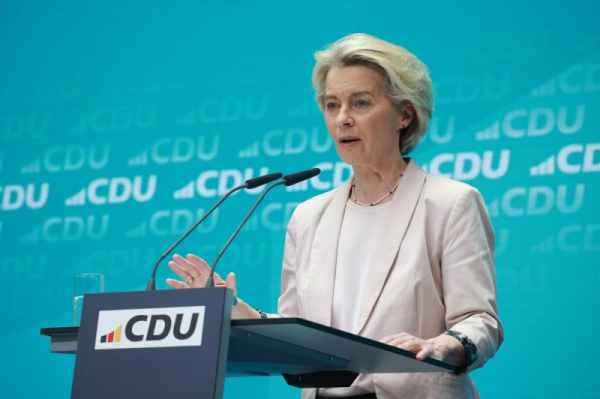
European Commission President Ursula von der Leyen speaks at a Christian Democratic Union party press conference in Belin on Monday at which she insisted the center ground of European politics was holding the line against a surge in popular support for the far right. Photo by Clemens Bilan/EPA-EFE
Far-right parties have made strong gains in the European Parliament, according to provisional results from four days of elections to send representatives to the 720-seat legislature across the 27-member country bloc.
The center-right Christian Democrat European People’s Party consolidated its position as the largest grouping in the assembly winning in Germany, Spain, Poland, Bulgaria, Slovenia, Lithuania, Luxembourg, Cyprus, Latvia, Estonia, Finland, Croatia, Greece and a better-than-expected showing in the Netherlands. Advertisement
The results added another 13 seats to bring the EPP’s total to 185 backed by its Socialists and Democrats partner, which held roughly steady at 137, but pro-Europe parties Renew and The Greens lost at least 42 seats.
However, far-right parties in France, Italy, Austria, the Netherlands and to a lesser extent in Germany and Romania were the big winners.
In France, Marine Le Pen’s National Rally heavily defeated French President Emmanuel Macron’s Renew grouping 30-13, prompting Macron to call a snap election, while Italian Prime Minister Giorgia Meloni’s European Conservatives and Reformist Group’s showing consolidated her place as the key mover and shaker in the parliament after increasing her share by an estimated 28.8% of the national vote. Advertisement
In Austria, the far-right FPO’s share of the vote jumped to 25.7%, sufficient to double its MEPs to six, according to European Parliament projections.
In the Netherlands Geert Wilders’ far-right PVV gained 6 of 31 seats up for grabs, the first time it has won seats in the assembly.
Germany’s Christian Democratic Union and Christian Social Union party was set to win 30% of the vote, slightly up on 2019, Chancellor Olaf Scholz’s Social Democrats are in second place, closely followed by the far-right Alternative for Germany which increased its share of the vote by more than three points over 2019 to 14.2%.
The math in the parliament is slightly altered when it comes to comparing results with the 2019 election due to the number of seats rising to 720 from 705 to account for new countries joining the bloc and the 2020 departure of Britain from the European Union.
European Commission president Ursula von der Leyen’s position appears to be secure thanks to a combined tally of more than 400 seats projected to have been won by her EPP and other centrist and liberal parties that approved her 2019-2024 term.
The former CDU deputy leader said she would reach out to these former partners to put together an EPP majority in the parliament. Advertisement
“Throughout my election campaign, I worked hard to build a broad and effective majority in favor of a strong Europe. For this reason, we will now approach the large political families who also worked well with us in the last mandate,” von der Leyen said.
However, her reappointment is not guaranteed as her candidacy has to be proposed by the national leaders who make up the European Council.
Even before the last polls closed across the European Union on Sunday, Macron dissolved parliament and called a general election to be held June 30 with a run-off poll on July 7, saying he had heard voters’ message.
“I’ve decided to give you back the choice of our parliamentary future through the vote. I am therefore dissolving the National Assembly,” he said in an address to the nation from the Elysee presidential palace.
Welcoming the snap election, Le Pen said her National Rally party stood “ready to take power if the French place their trust in us.”
Germany’s Scholz is facing calls to follow suit and call an election now — 16 months early — after the SPD’s worst electoral performances in more than 100 years.